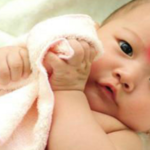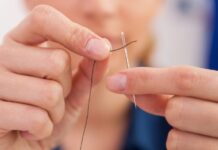This article is professionally reviewed by Master, Doctor Phan Thi Cam Van – Neonatal Doctor – Pediatrics – Neonatology – Vinmec Danang International General Hospital. She has 7 years of experience as a resident doctor and treating doctor for Pediatrics and Neonatology at Hue Central Hospital and Hue University of Medicine and Pharmacy. Her strengths include treating pediatric respiratory, digestive, and infectious diseases, as well as caring for and treating newborns and neonatal resuscitation.
After crying at birth, newborns will leave the protection of their mother’s body and have to adapt to the outside environment on their own, learning to breathe, suckle, and cope with hot and cold weather… To protect their health and overall development, it is very important to take care of newborns until they are one month old, and there are many issues that parents need to pay attention to.
1. Guide to newborn care in the first 7 days
The first 7 days after birth are quite important for a newborn under one month old as this is still the neonatal period, and the risk of infant mortality if not properly cared for is very high (accounting for 50%). During this period, the infant’s cranial nerves are inhibited due to excessive sleep, and they only wake up when hungry or when their diaper is wet, so parents need to pay special attention and care.
How to care for a newborn under one month old is to keep the baby warm. If the baby gets cold and their body temperature drops for a long period, it will create conditions for bacteria to attack and cause various illnesses. If there are no issues with the mother and baby after birth, it is best to room-in, which helps foster the mother-child bond, transmit warmth from mother to child, and allows the mother to observe the baby at all times, promptly addressing any unexpected issues.
In the womb, the baby receives continuous nutrition from the mother’s blood through the placenta. Therefore, newborns are prone to hunger and cold, and they need enough energy to keep their bodies warm and withstand the outside temperature. When caring for a newborn in the first week of life, it is important to remember that they have a very high demand for food and should be breastfed as soon as possible after birth. Mothers should respond to their baby’s needs whenever they are hungry, rather than following a strict schedule.
Colostrum is the main and best food for the baby’s development during this period. Science has proven that IgA in colostrum in the first 7 days contains a thousand times higher concentration than in regular milk, and there are up to 4,000 white blood cells in 1cm3 of colostrum, which can help babies kill intestinal bacteria. Therefore, mothers should not discard colostrum but instead fully utilize it for their baby’s nutrition. Newborns under one month old who are breastfed colostrum immediately after birth have a very low risk of developing pneumonia and diarrhea.
Some normal physiological manifestations are also very common in newborns under one month old, such as passing meconium, dark green or odorless stools, thick consistency, etc. However, if the baby does not pass meconium within 2 days, loses weight, or shows signs of jaundice, frequent choking during breastfeeding, difficulty breathing, cyanosis, stiff jaw, excessive crying, or prolonged sleep, these are abnormal signs, and parents should take the baby to the hospital for a health check-up and timely treatment. In the case of a cephalohematoma, it is necessary to monitor and not puncture it, as this may cause infection and endanger the baby.
Additionally, when caring for a newborn in the first week of life who is underweight or premature but does not show any abnormal signs, it is necessary to monitor them at a medical facility until the doctor approves their discharge. Once at home, continue to carefully monitor and care for the baby.

2. How to care for a newborn until they are one month old
The neonatal period lasts until the baby is 28 days old, and during this time, the risks to the baby will gradually decrease if properly cared for by the parents. Therefore, learning how to care for a newborn under one month old is essential for any parent.
2.1 Care for the baby during feeding
When a baby is first born, their feeding reflexes are still very immature, so support from the mother is crucial. Improper feeding can cause the baby to spit up milk or vomit, which is very dangerous. In addition to performing the correct feeding techniques, parents should prevent spitting up by holding the baby upright for a few minutes and gently patting their back after feeding. When sleeping, the baby should be placed with their head slightly elevated or on their side to reduce the risk of aspiration. Never let an infant under one month old sleep on their stomach.
Science has proven that breast milk is the best food for the health and development of newborns, so if the mother has enough milk, she should ensure exclusive breastfeeding until the baby is one year old. To have an abundant milk supply, mothers should eat multiple small meals a day, consume a balanced diet with adequate nutrition, and drink plenty of water. Additionally, frequent breastfeeding can stimulate milk production.

2.2 Umbilical cord care and bathing the baby
Newborns under one month old are very susceptible to neonatal infections through the umbilical cord, so daily cord care is essential and must be performed by the parents. After bathing the baby, clean the cord with physiological saline and dry it thoroughly. Do not apply anything to the cord, and if you want it to fall off faster, keep it exposed to air and do not bandage it tightly.
Before bathing an infant under one month old, parents should prepare enough clothes, diapers, towels, bath towels, bathwater, eye and nose drops, etc., to be able to help the baby with their hygiene and keep them warm immediately after bathing. The bathing area should be enclosed to prevent drafts. If you are not using cooling herbal baths, choose a baby-specific bath product with natural ingredients, and remember to dry the baby thoroughly before dressing them. In winter, it is not necessary to bathe the baby every day.
2.3 Wearing a hat and swaddling the baby properly
Many mothers are afraid that their babies will catch a cold, so they make them wear hats constantly, day and night, regardless of the temperature. However, this habit is not good. Newborns under one month old release heat through their scalp, so mothers should pay attention to the area behind the baby’s neck. If the weather is hot, only a cap to cover the fontanelle is needed when going out or at night, and the baby’s head should be kept uncovered when indoors. Since newborns cannot regulate their body temperature yet, constantly wearing a hat will cause excessive sweating, making them itchy and fussy, and in some cases, it can even increase their body temperature and cause high fever.
Some believe that tight swaddling will prevent the baby from startling and help them sleep better and cry less. However, scientific research has proven this practice to be wrong. Swaddling the baby too tightly can risk pressing the hip joints, forcing them to stretch straight and forward, causing the baby’s legs to become misaligned, constricted, hot, and uncomfortable…
2.4 Skin, eye, tongue, and nose care for the baby
When caring for a newborn under one month old, special attention must be paid to the baby’s delicate skin and eyes. Skin and eye care, as well as the choice of skincare products, should follow these principles:
- Avoid exposing the baby’s skin to harsh soaps or cosmetics with irritating substances;
- Change diapers immediately when wet and use mild products to counteract the irritation caused by urine and stool, preventing diaper rash;
- Maintain the baby’s skin at the appropriate moisture level;
- Prevent harmful chemicals from affecting the baby’s eyes. If the baby has excessive tearing and eye discharge in the first few days after birth, clean their eyes daily with pediatric saline solution;
- Use a separate towel to wipe the baby’s face.
Additionally, the nose and tongue should also be cleaned daily. Physiological saline can be used to clean the nose and tongue to reduce the number of harmful microorganisms in the mouth and improve the baby’s sense of taste.
2.5 Other considerations
Taking the baby’s temperature daily is an essential part of caring for a newborn under one month old. Since newborns are very sensitive, it is necessary to have a thermometer on hand to check their temperature whenever they feel warm or their hands and feet are cold. The normal body temperature for a newborn is between 36.5 and 37 degrees Celsius.
- If the temperature is above 37.5 degrees Celsius, the baby should wear loose, breathable clothing, and the number of blankets should be reduced. Breastfeed more frequently;
- If the temperature exceeds 38 degrees Celsius, the baby has a fever. If cooling and antipyretic measures are ineffective, take the baby to a medical facility for examination and treatment immediately.
One thing to keep in mind when caring for a newborn under one month old is that their bodies are very fragile, and their immune systems are weak, so do not let others kiss the baby on the mouth or hold them closely. Doing so increases the risk of bacterial and viral infections, which can cause harm to the baby.
Caring for a newborn under one month old can be overwhelming for first-time parents. However, parents and other family members should try to learn the correct way to care for the baby, as the care provided during these early days will greatly impact the baby’s development.
Mẹo hay ST
Avoid these taboos to keep your child safe and healthy
Having discipline and following certain rules and guidelines can bring numerous benefits to your life. Adhering to the saying “Có thờ có thiêng, có kiêng, có lành” (meaning “Being respectful, having restrictions, and doing good deeds”), you can experience positive changes in your overall well-being. By abstaining from certain behaviors or actions, you can cultivate a sense of self-control and improve your character. These practices not only create a harmonious balance in your life but also contribute to your personal growth and success. Embracing this philosophy can lead to a fulfilling and purposeful existence, allowing you to navigate life’s challenges with wisdom and resilience. As you embark on this journey of self-discipline, you will discover the transformative power it holds and the countless rewards it brings. So, embrace the principles of respect, restrictions, and benevolence and unlock the true potential within yourself.
































